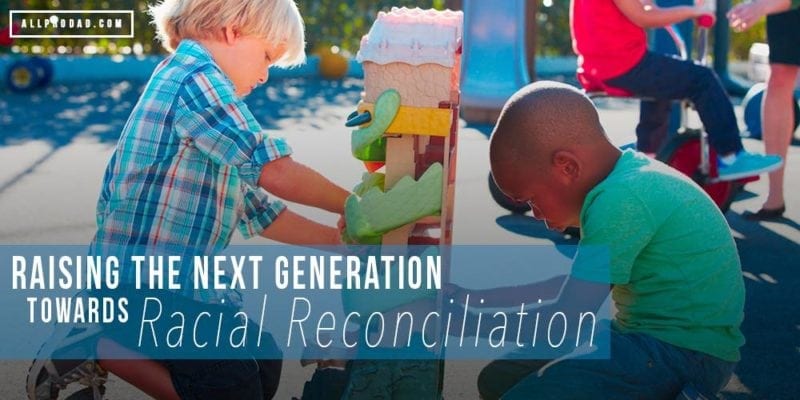Several years ago, I was the chaplain for the local football team. I would often ride the bus with the players to away games. On one bus ride, I was sitting with a player who turned to me and asked, “Can I tell you a racist joke?” I told him he couldn’t. He was shocked and asked why. I told him that I have a number of friends from different races who I know would be hurt by a joke like that and I didn’t want to be associated with it. It was an uncomfortable moment, but necessary for two reasons. First, he didn’t understand or care that there were several teammates who I know a joke like that would frustrate and hurt. Second, and sadder, he didn’t seem to realize that he actually possessed many of the underlying prejudice attitudes the joke would have entailed.
Are your children truly color-blind when interacting with someone from a different race? Being prejudiced does not just mean donning a KKK outfit and raising havoc. The dictionary definition is simply “an unfavorable opinion or feeling formed beforehand.” It is natural for many people to be prejudiced and this tendency must be challenged. Though we have made a lot of progress in our country on race, obviously we still have work to do. Here are the 10 ways to teach your children not to be prejudiced.
1. Keep the Heart Pure From Hate
No child is born with hate. It is strictly a learned behavior. As parents, we have a large responsibility to tightly control our speech and actions. Children are always watching. Always. If Dad constantly spews racial slurs in front of his child, that child will learn to do the same. If Mom blatantly favors only people of a specific social background, her daughter will certainly do the same. It’s not just a matter of what you do, it a matter of what’s in your heart. Keep your heart pure.
2. Embrace Uniqueness
It has been noted that children who feel confident about themselves are less likely to be prejudiced. Make a point to acknowledge the unique qualities and abilities of each of your children. Celebrate their differences. Let them see you doing the same with other people as well.
3. Find the Beauty in Everyone
Some people look at others and find faults. It makes them feel better about their own shortcomings. However, we are all created in the image of God. So there is beauty in every single living thing. An amazing kindness. A glorious spirit. A giving and generous heart. Beauty comes in many, many forms. Look for the beauty and not the negative in everyone you encounter. The lives of your family will be greatly enriched by doing so.
4. Mix it Up
Socialize with all types of people from all types of backgrounds. Do not limit yourself strictly to one area. Mix it up and turn ordinary into extraordinary.
5. Observe and Learn
Pay attention to what your children are watching and listening to. Always point out prejudice when you recognize it. Discuss with them what you just saw or heard. Explain why it was wrong.
6. Kindness and Consideration
A child that has been taught to be kind to others will most likely not be prejudiced. Teach them to be considerate to the feelings of others and their point of view. A little kindness can cure a whole lot of potential wrongdoing.
7. Confront it
One time a high schooler asked me if he could tell me a racist joke. I told him no. He was surprised and asked why. I told him I didn’t want to be associated with racists jokes or attitudes. Remember that hate is a learned trait. Stomp it out.
It’s not just a matter of what you do, it a matter of what’s in your heart.8. Get Out of Your Comfort Zone
Despite good intentions, people generally do tend to congregate with those that are similar. That is not a terrible thing. It creates cultures and traditions. However, it is important to not allow your family to get too comfortable in that same zone. Get out in the community and experience other walks of life. Volunteer at a homeless shelter. Join a Habitat for Humanity project. Visit an Asian street festival. The food will be great! Many opportunities exist to give your children a broad range of life experience. Just get out there and have fun.
9. The Influence of Friends and Family
We can’t choose our family, but we can choose our friends. Do not have family or friends around that use bigoted language. Let them know that you do not appreciate it and that you might have to take a break from the friendship. If Grandpa is still acting like it is 1960, tell him it’s time to change if he wants to enjoy his grandchildren. The circle of hate must be broken for society to thrive.
10. Look in the Mirror
We are probably all prejudice to some degree. Search out your own bias and experience that may be causing you to judge other people based on stereotypes and misinformation. When explaining an issue to our children, we can be tempted to give all of the best arguments for our position while creating a straw man for the other side. Give the best arguments for both. Try to see life from others perspectives. Think about what experience and pain may be causing them to see the world in a different way. It will make all the difference to your children.











Huddle up with your kids and ask, “What do you think it means to be prejudiced?”